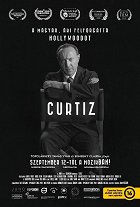Réalisation:
Tamas Yvan TopolanszkyPhotographie:
Zoltán DévényiMusique:
Gábor SubiczActeurs·trices:
Ferenc Lengyel, Nikolett Barabás, Lili Bordán, Kata Sarbó, Declan Hannigan, Björn Freiberg, Caroline Boulton, Evelin Dobos, József Gyabronka (plus)VOD (1)
Résumés(1)
En 1942, les États-Unis s’apprêtent à s’engager dans la Deuxième Guerre mondiale. Le cinéaste Michael Curtiz, né en Hongrie, s’apprête à tourner CASABLANCA, qui contribuera à la propagande américaine. Curtiz, qui est Juif, essaie de faire sortir sa fille de Hongrie, mais comprend qu’un film anti-nazi, et d’autant plus mis en scène par un Juif, pourrait la compromettre et la placer dans une situation de danger. Plus tard, alors qu’il est aux prises avec les problèmes de la production, la fille de Curtiz apparaît dans le plateau de tournage et lui demande pourquoi il l’a abandonnée lorsqu’elle n’était qu’une enfant. (Montreal World Film Festival)
(plus)Critiques (1)
My Hungarians understand me. It makes sense that they adapted the journey behind the making of one of Hollywood's symbols in Michael Curtiz's own homeland, and it's nice that they didn't turn the directorial matador into a likable pushover at all costs. Apparently, this giant was a choleric and a brute who lost his touch with people. I really like the confirmation of all the theories, that the choice of the now legendary ending of Casablanca was quite a lottery. Unfortunately, I don't agree with the exploration of the close female characters, who never quite settle into the storyline, as well as the artistic "anonymization" of the famous acting duo. Thanks to occasional colorful surprises or a tense atmosphere of creating something great, I believed until the end that I would receive a warmer reward as a fan of the mythologized film, but in that regard Curtiz remained (symbolically) completely indifferent.
()

